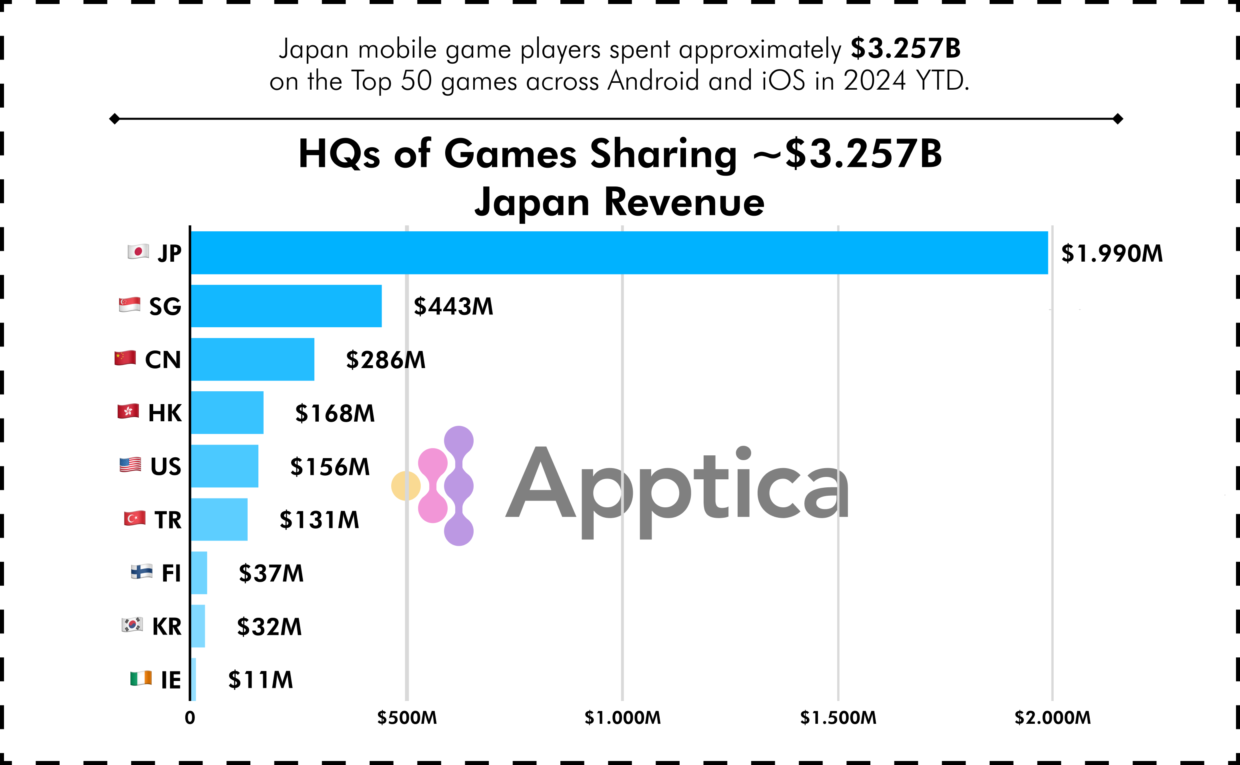
In the first 9 months of 2024, Japanese mobile game players spent ~$3.257 billion on games across Android and iOS platforms. But what’s really fascinating is that 61% of this spending—about $1.99 billion—went to games developed by Japanese companies.
Just a little note, 35.51% of the money spent by American players in the same time period goes into the pockets of American developers, you can check it out here.

Data Source: Apptica
Singapore (13.61%) ranked 2nd in successfully taking the most money from Japanese players’ pockets, followed by China (8,79%) in 3rd, Hong Kong (5,17%) in 4th, the USA (4,81%) in 5th, Turkey (4,02%) in 6th, Finland (1,14%) in 7th, South Korea (1,00%) in 8th, and Ireland (0,34%) in 9th.
This overwhelming preference for homegrown titles isn’t just about patriotism or familiarity; it’s a reflection of deeper cultural, social, and market dynamics that make Japanese games resonate so strongly with local players.
One of the key reasons behind this is Japan’s cultural fabric, which plays a significant role in shaping consumer behavior, including gaming preferences.
Japan has a long-standing collectivist society where people tend to value group harmony and societal norms over individualism.
This mindset is often mirrored in the games that Japanese developers create. Many Japanese games focus on themes of cooperation, responsibility, and sacrifice for the greater good, which aligns closely with societal values. As a result, Japanese players see a reflection of their own cultural narratives in these games, making them feel more connected to the characters and stories.
Additionally, the sheer historical depth of Japan’s gaming industry plays a huge role. With iconic companies like Nintendo, Sony, Square Enix and Sega being central to the rise of video games globally, Japan has built an immense level of trust and loyalty among its players.

Japanese gamers have grown up with these brands, knowing that they represent high-quality craftsmanship, innovation, and immersive storytelling. This ingrained confidence in the quality of Japanese games means that local players are more inclined to choose domestic titles over foreign ones, especially when it comes to mobile games, where detail, gameplay mechanics, and user experience are critical.
One of the biggest factors contributing to this is the meticulous attention to detail that Japanese developers put into their games.
It’s not just about flashy graphics or complex gameplay mechanics—though those are definitely important—but also about narrative depth, character development, and world-building.
Japanese gamers expect their games to be meticulously crafted, where every element feels intentional. This level of quality is something they know they can trust from local studios, giving them a reason to favor Japanese-made games.
Language and localization are other critical factors. Japanese players expect their games to be fully localized in a way that feels authentic and natural. The Japanese language has nuances and intricacies that can be hard to capture for non-native developers.
Foreign games often struggle to translate cultural and linguistic subtleties in a way that resonates with local audiences, which can make them feel less engaging. In contrast, Japanese-made games are designed with the local audience in mind from the outset.
This seamless integration of language and culture makes domestic titles more accessible and appealing to Japanese gamers. In many ways, it’s simply easier for them to connect with these games.
Beyond language and cultural connections, the strategic innovations in mobile gaming by Japanese developers cannot be overlooked. Japan’s game development scene is renowned for its technological innovation and ability to stay ahead of market trends. Japanese studios continuously push the envelope in terms of gameplay mechanics, creating new and exciting experiences that keep players engaged. Whether it’s through unique game design or clever monetization models, Japanese developers have managed to keep their games fresh and appealing in an increasingly crowded market.
Ultimately, the dominance of Japanese developers in their home market is no coincidence. It’s the result of a combination of cultural resonance, historical trust, linguistic accessibility, and constant innovation.
Japanese players naturally gravitate towards games that feel familiar yet fresh, and Japanese developers have mastered the art of delivering just that.
As one of the largest and most competitive gaming markets in the world, Japan’s preference for homegrown games offers a valuable lesson to foreign developers: understanding and adapting to local culture is crucial.
In conclusion,
Japan’s mobile gaming market isn’t just a reflection of global gaming trends—it’s a unique ecosystem shaped by deep-rooted cultural values, trust in local craftsmanship, and a consistent drive for innovation.
For any developer looking to break into the Japanese market, it’s not just about offering a fun game; it’s about understanding the profound connections that players have with their own culture and delivering an experience that speaks directly to that.
“WHAT’S OURS SHALL STAY WITH US” ~Japanese Players







